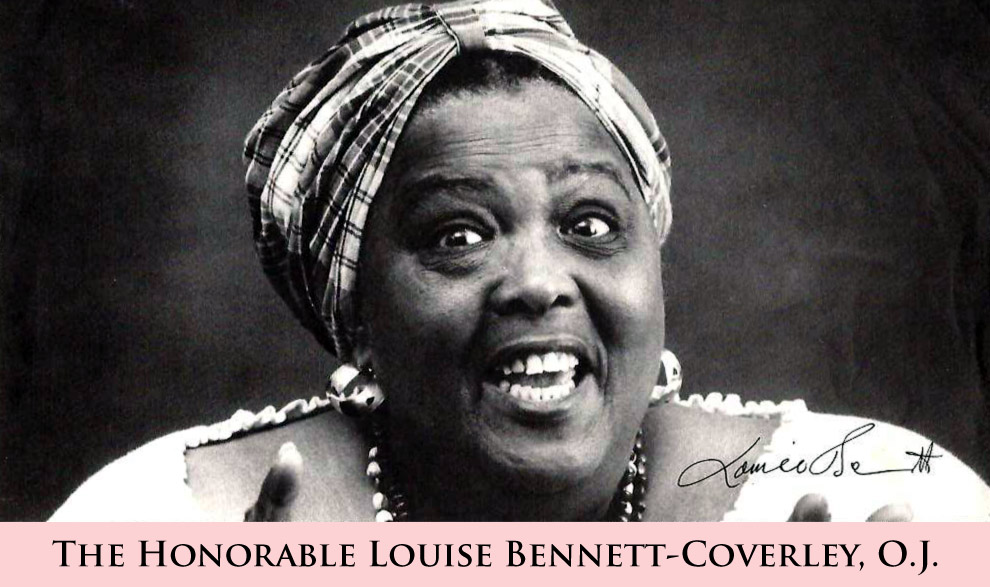The Right Honorable Dr. Louise Bennett-Coverley was born in Kingston, Jamaica, on September 7, 1919. She died in Ontario, Canada, on July 26, 2006. Her body was flown back to Jamaica to lie in state in the National Arena, and then buried in National Hero’s Park, next to other great heroes and leaders of Jamaica. This park is just across the street from where my mother grew up.

She is better known in Jamaica as Louise Bennett, or more affectionately Miss Lou. She is known to a generation of Jamaicans for her television show performing children’s folk tales of Brother Anansi, the trickster spider. Brother Anansi uses his cunning against his opponents. The stories contain wisdom by ending with a proverb. My dad remembers her coming to the rural country areas to perform at schools when he was young.
“The children need to know their stories.”
—Miss Lou (the original patois, “de pickney-dem learn de sinting dat belong to dem.“)
The Right Honorable Doctor
Louise Bennett was also a poet, folk singer, comedienne, writer and educator. The only daughter of a baker and a dressmaker, she was the first black student at the Royal Academy of Dramatic Arts in Britain. She studied drama and Jamaican folklore, and would later teach at the University of West Indies.
In 1960, she became a member of the Most Excellent Order of the British Empire for her contribution to arts and literature, which is equivalent to a knighthood. And thus, she is the “Right Honorable”.
In 1974, she became a member of the Order of Jamaica, among many other honors.
In 1998, she received an honorary Doctorate of Letters from York University, and thus, she is “The Right Honorable Doctor.”
One of Jamaica’s National Treasures
As a country once ruled by the British, Jamaican children were taught “the Queen’s English” as the proper way to speak in school. They were taught that their own dialect was a poor derivative and corruption of the English language.
Louise Bennett wrote her poems, songs, and stories in the common vernacular. The colorful local Jamaican patois is a melting pot of influences from West Africa and Britain. For many years, the Jamaican Gleaner refused to publish her poetry because it was in patois. However, she continued to bring to the stage the rich color of Jamaican life in their own native language.
“The children need to know their stories.”
—Miss Lou
For a generation of Jamaicans, she taught them pride in the way they speak, their patois, their culture, their songs, and their stories. For this reason, she is one of Jamaica’s national treasures.
Mentos
Louise Bennett also sang many Jamaican folk songs which are called “mentos.” (Today, this style of music is often sold under the category of “calypso”, which is originally from Trinidad, but has come to refer to the music of the Caribbean.) Jamaican mentos have their origin in the work songs. For example, workers hired by the government to dig a ditch would sing a work song. One worker was even hired just to sing the song. The other workers would sing the chorus. The rhythm kept the workers moving, minds occupied, and work got done.
One of the famous songs that she would sing was made famous by another artist (Harry Belafonte).
Imagine that you are working to load the banana boat at the dock all night long. You raise up bunches of bananas, and at the end of the work shift you wait for the boss to come and count or tally up your bananas so you could get paid. You see the hint of the rising sun.
If you listen between the silence, you might hear:
Day-O Day-O
Daylight come and me wan’ go home.
(chorus translation: Daylight has come, and I want to go home.)Work all night on a drink of rum
(Daylight come and me wan’ go home)Stack banana till the mornin’ come
(Daylight come and me wan’ go home)Lift six foot, seven foot, eight foot bunch
(Daylight come and me wan’ go home)Come, Mister Tally Man, tally me banana
(Daylight come and me wan’ go home)
Listen to my Podcast
![]() “Story: Louise Bennett, National Treasure of Jamaica”
“Story: Louise Bennett, National Treasure of Jamaica”



